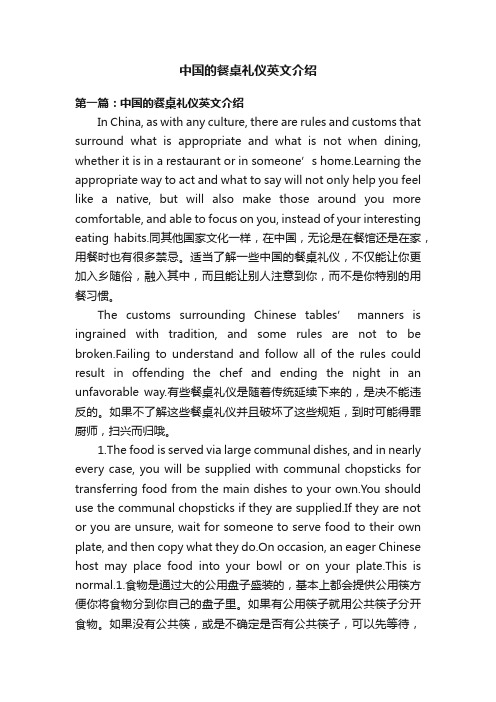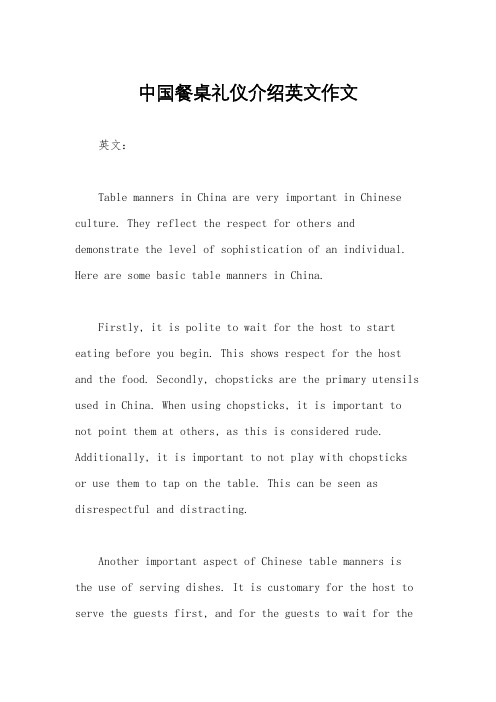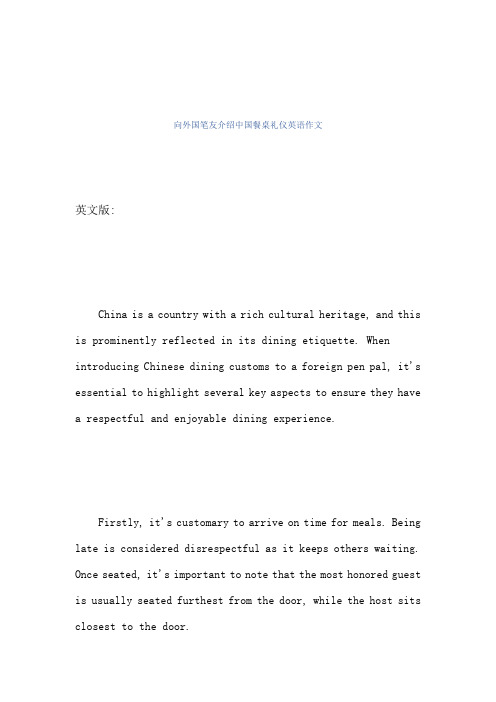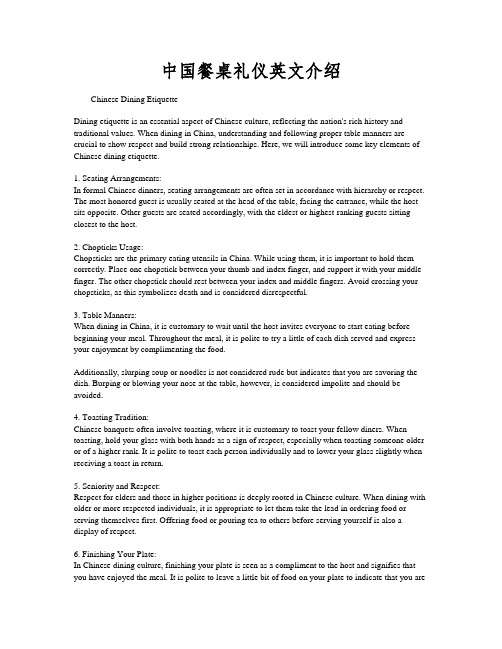中国的餐桌礼仪英文介绍
中国的餐桌礼仪英文介绍

中国的餐桌礼仪英文介绍第一篇:中国的餐桌礼仪英文介绍In China, as with any culture, there are rules and customs that surround what is appropriate and what is not when dining, whether it is in a restaurant or in someone’s home.Learning the appropriate way to act and what to say will not only help you feel like a native, but will also make those around you more comfortable, and able to focus on you, instead of your interesting eating habits.同其他国家文化一样,在中国,无论是在餐馆还是在家,用餐时也有很多禁忌。
适当了解一些中国的餐桌礼仪,不仅能让你更加入乡随俗,融入其中,而且能让别人注意到你,而不是你特别的用餐习惯。
The customs surrounding Chinese tables’ manners is ingrained with tradition, and some rules are not to be broken.Failing to understand and follow all of the rules could result in offending the chef and ending the night in an unfavorable way.有些餐桌礼仪是随着传统延续下来的,是决不能违反的。
如果不了解这些餐桌礼仪并且破坏了这些规矩,到时可能得罪厨师,扫兴而归哦。
1.The food is served via large communal dishes, and in nearly every case, you will be supplied with communal chopsticks for transferring food from the main dishes to your own.You should use the communal chopsticks if they are supplied.If they are not or you are unsure, wait for someone to serve food to their own plate, and then copy what they do.On occasion, an eager Chinese host may place food into your bowl or on your plate.This is normal.1.食物是通过大的公用盘子盛装的,基本上都会提供公用筷方便你将食物分到你自己的盘子里。
英语介绍中国餐桌礼仪

英语介绍中国餐桌礼仪 ⽐如现在你要给⼀个国外来的有⼈介绍我们的中国的餐桌礼仪,那么你知道我们要注意什么吗?下⾯是店铺为⼤家整理的英语介绍中国餐桌礼仪,希望能够帮到⼤家哦! 英语介绍中国餐桌礼仪 中国饮⾷在世界上是很有名的。
Ibelieve the Chinese food is famous around the world. 假如你来到中国,中国朋友请你吃饭,你就需要了解⼀下有关宴会中的座次问题。
Andif you are in China and you are asked by your Chinese friend to a dinner, youmay want to know how to pick up your seat at the table and what is the properway to sit at the table. 这个位⼦⼀般是主位,是主⼈的。
Well,normally this seat is the seat for the host or the hostess. 这个位⼦⾯朝着门。
(⾯朝着门的⼀般是主位。
)Theseat is facing the door of this room. 也可以根据餐⼱的样式来辨别座位。
Onemay also distinguish the seats at the table from the style in which the napkinsare folded. ⽆论餐⼱折成什么样式,最⾼的餐⼱对应的座位,⼀定是主位。
Regardlessof how the napkins are arranged.,thetallest arrangement will always correspond to the master seat. ⼀张坐四五个⼈的⼩桌⼦,与主⼈的座位相对应的背对着门的那个位置则是被邀请的主客坐的位置。
(完整版)中国餐桌礼仪英文版

Eat with little noise and movement
Help people to dish the serving chopsticks ,centiliter ,not use yours
Qing Dynasty by the impact of Western food, some Western rituals have also been introduced. Such as sub-dishes, on the soup, into the wine, etc, because of reasonable health way, it was introduced into the Chinese etiquette.
Had better not pick your teeth. If you must do it ,you should screen your mouth with napin or your hands
Leave the feast
When you leave the feast,you should show your thank to the master , or invite the master to your house here after.
Lead the guest to the seat of honor,then lead the senior to the seae next to the guest
Take the seat from left
Do not start eating in a hurry or make noise
中国餐桌礼仪介绍英文作文

中国餐桌礼仪介绍英文作文英文:Table manners in China are very important in Chinese culture. They reflect the respect for others and demonstrate the level of sophistication of an individual. Here are some basic table manners in China.Firstly, it is polite to wait for the host to start eating before you begin. This shows respect for the host and the food. Secondly, chopsticks are the primary utensils used in China. When using chopsticks, it is important to not point them at others, as this is considered rude. Additionally, it is important to not play with chopsticks or use them to tap on the table. This can be seen as disrespectful and distracting.Another important aspect of Chinese table manners is the use of serving dishes. It is customary for the host to serve the guests first, and for the guests to wait for thehost to start eating before they begin. It is also polite to take small portions of food at a time, so that there is enough for everyone.Finally, it is important to show appreciation for the food and the host. Complimenting the food and thanking the host for the meal is a sign of respect and gratitude.中文:在中国文化中,餐桌礼仪非常重要。
中国餐桌礼仪 英文作文

中国餐桌礼仪英文作文1. When dining in China, it is important to remember that the Chinese place a great emphasis on respect and courtesy at the dining table. This means that you should always wait for the host or the eldest person at the table to start eating before you begin.2. In addition to waiting for the host to start eating, it is also important to use chopsticks correctly. Hold the chopsticks towards the end, and use your thumb and middle finger to control them. Avoid using them to point at people or objects, as this is considered impolite.3. Another important aspect of Chinese dining etiquette is the use of serving utensils. It is considered rude to use your own chopsticks to pick up food from shared dishes. Instead, use the serving utensils provided to transfer food to your plate.4. When eating rice or soup, it is acceptable to bringthe bowl closer to your mouth. However, it is considered impolite to slurp your soup or make loud noises while eating. Remember to eat quietly and with good table manners.5. When drinking tea or other beverages, it is politeto pour tea for others before pouring for yourself. If someone pours tea for you, it is customary to tap your fingers on the table as a sign of gratitude. Additionally,it is polite to hold the teacup with both hands when someone is pouring tea for you.6. When finished eating, it is customary to leave a small amount of food on your plate. This is a sign that you have been satisfied with the meal. However, it is important not to leave too much food, as this can be seen as wasteful.7. Finally, it is customary to thank the host for the meal and express your appreciation for their hospitality. This can be done by saying "xièxiè" (thank you) or"fēicháng hǎochī" (the food was delicious). It is also polite to offer to help with the cleaning up after the meal.8. Overall, Chinese dining etiquette is centered around respect, courtesy, and showing appreciation for the food and the host. By following these guidelines, you can ensure a pleasant and respectful dining experience in China.。
英文版中国餐桌礼仪

Second :manners at mealtimes
• Don't eat until everyone is there. Don't reach to get the food on the opposite side. • Ask the visitor and the elder to move the chopsticks first. • The hosts should help the guests to the food or ask them to help themselves. • Eat with little noise and movement. Do not make a hiccup (打嗝) or a sound like a hiccup. • You may not slurp(出声地吃喝)your soup.
after take the seat, keep a proper posture;
keep your feet under your seat, don’t
straighten or step
under others’
seats;
don’t keep your elbows(肘部)to the edge of the table or put your hands on another chair’s back .
Definitude the primary mission of the meal. If it is a business meal, together to communicate with each other. However if it is only to make friendly contacts, what you need to do is just
向外国笔友介绍中国餐桌礼仪英语作文

向外国笔友介绍中国餐桌礼仪英语作文英文版:China is a country with a rich cultural heritage, and this is prominently reflected in its dining etiquette. When introducing Chinese dining customs to a foreign pen pal, it's essential to highlight several key aspects to ensure they have a respectful and enjoyable dining experience.Firstly, it's customary to arrive on time for meals. Being late is considered disrespectful as it keeps others waiting. Once seated, it's important to note that the most honored guest is usually seated furthest from the door, while the host sits closest to the door.Secondly, the use of chopsticks is a significant part of Chinese dining. It's impolite to stick chopsticks upright in a bowl of rice, as this resembles incense sticks used in funerals. Instead, place them across the chopstick rest or on the edge of the table.Another important etiquette is to wait for the host to start eating before you begin. It's also polite to take small portions and return for seconds if you're still hungry. Overloading your plate is considered impolite.Additionally, it's common for the host to offer you food multiple times during the meal. It's polite to initially decline, but after a few offers, you can accept.Lastly, burping or slurping is considered a sign of appreciation for the food, although this might be surprising to some foreigners. However, it's best to gauge the situation and follow the host's lead.Chinese dining etiquette is a reflection of the country's emphasis on respect, community, and enjoyment of food. Understanding these customs will help any foreigner navigate a Chinese meal with grace and appreciation.中文版:中国是一个拥有丰富文化遗产的国家,这一点在其餐桌礼仪中得到了显著体现。
中国餐桌礼仪英文介绍

中国餐桌礼仪英文介绍Chinese Dining EtiquetteDining etiquette is an essential aspect of Chinese culture, reflecting the nation's rich history and traditional values. When dining in China, understanding and following proper table manners are crucial to show respect and build strong relationships. Here, we will introduce some key elements of Chinese dining etiquette.1. Seating Arrangements:In formal Chinese dinners, seating arrangements are often set in accordance with hierarchy or respect. The most honored guest is usually seated at the head of the table, facing the entrance, while the host sits opposite. Other guests are seated accordingly, with the eldest or highest-ranking guests sitting closest to the host.2. Chopticks Usage:Chopsticks are the primary eating utensils in China. While using them, it is important to hold them correctly. Place one chopstick between your thumb and index finger, and support it with your middle finger. The other chopstick should rest between your index and middle fingers. Avoid crossing your chopsticks, as this symbolizes death and is considered disrespectful.3. Table Manners:When dining in China, it is customary to wait until the host invites everyone to start eating before beginning your meal. Throughout the meal, it is polite to try a little of each dish served and express your enjoyment by complimenting the food.Additionally, slurping soup or noodles is not considered rude but indicates that you are savoring the dish. Burping or blowing your nose at the table, however, is considered impolite and should be avoided.4. Toasting Tradition:Chinese banquets often involve toasting, where it is customary to toast your fellow diners. When toasting, hold your glass with both hands as a sign of respect, especially when toasting someone older or of a higher rank. It is polite to toast each person individually and to lower your glass slightly when receiving a toast in return.5. Seniority and Respect:Respect for elders and those in higher positions is deeply rooted in Chinese culture. When dining with older or more respected individuals, it is appropriate to let them take the lead in ordering food or serving themselves first. Offering food or pouring tea to others before serving yourself is also a display of respect.6. Finishing Your Plate:In Chinese dining culture, finishing your plate is seen as a compliment to the host and signifies that you have enjoyed the meal. It is polite to leave a little bit of food on your plate to indicate that you aresufficiently satisfied.By following these Chinese dining etiquettes, you will not only show respect for the Chinese culture but also enhance your dining experience by enjoying the delicious cuisine. Remember, Chinese dining is not just about the food; it is about harmonious social interactions and building friendships.。
- 1、下载文档前请自行甄别文档内容的完整性,平台不提供额外的编辑、内容补充、找答案等附加服务。
- 2、"仅部分预览"的文档,不可在线预览部分如存在完整性等问题,可反馈申请退款(可完整预览的文档不适用该条件!)。
- 3、如文档侵犯您的权益,请联系客服反馈,我们会尽快为您处理(人工客服工作时间:9:00-18:30)。
In China, as with any culture, there are rules and customs that surround what is appropriate and what is not when dining, whether it is in a restaurant or in someone’s home. Learning the appropriate way to act and what to say will not only help you feel like a native, but will also make those around you more comfortable, and able to focus on you, instead of your interesting eating habits. 同其他国家文化一样,在中国,无论是在餐馆还是在家,用餐时也有很多禁忌。
适当了解一些中国的餐桌礼仪,不仅能让你更加入乡随俗,融入其中,而且能让别人注意到你,而不是你特别的用餐习惯。
The customs surrounding Chinese tables’ manners is ingrained with tradition, and some rules are not to be broken. Failing to understand and follow all of the rules could result in offending the chef and ending the night in an unfavorable way.
有些餐桌礼仪是随着传统延续下来的,是决不能违反的。
如果不了解这些餐桌礼仪并且破坏了这些规矩,到时可能得罪厨师,扫兴而归哦。
1. The food is served via large communal dishes, and in nearly every case, you will be supplied with communal chopsticks for transferring food from the main dishes to your own. You should use the communal chopsticks if they are supplied. If they are not or you are unsure, wait for someone to serve food to their own plate, and then copy what they do. On occasion, an eager Chinese host may place food into your bowl or on your plate. This is normal.
1. 食物是通过大的公用盘子盛装的,基本上都会提供公用筷方便你将食物分到你自己的盘子里。
如果有公用筷子就用公共筷子分开食物。
如果没有公共筷,或是不确定是否有公共筷子,可以先等待,看其他人是怎么做的,然后效仿就行。
有时候热心的中国主人会帮你将食物分到你的盘子里,这很正常。
2. It is rude to not eat what you are given. If you are offered something you absolutely can't stomach, finish everything else, and leave the rest on your plate. Leaving a little food generally indicates that you are full.
2. 分到你盘子的食物你不吃是很失礼的。
如果有些食物你真的吃不下可以先把其他能吃的吃掉,然后把不想吃的剩在盘子里就行。
通常盘子里剩下一点儿食物说明你已经吃饱了。
3. Don't stab your chopsticks into your bowl of rice. As with any Buddhist culture, placing two chopsticks down in a bowl of rice is what happens at a funeral. By doing this, you indicate that you wish death upon those at the table.
3. 不要把筷子插在装满米饭的碗里。
因为在佛教文化里,将双筷插在碗里是葬礼时的祭祀仪式。
如果你在餐桌上这么做,意味着你希望餐桌上在座的人死掉。
4. Do not play with your chopsticks, point at objects with them, or drum them on the table - this is rude. Do not tap them on the side of your dish, either, as this is used in restaurants to indicate that the food is taking too long, and it will offend your host.
4. 不要把玩筷子,比如用筷子指手画脚,或是在桌上敲击筷子,这些都是很失礼的,也切勿用筷子敲击你的盘子,这在餐馆里是暗示上菜太慢,很有可能会触怒待客的主人。
5. When setting down your chopsticks, place them horizontally on top of your plate, or place the ends on a chopstick rest. Do not set them on the table.
5. 当你想放下筷子时,要将筷子水平放置在你的盘子上,或者将筷子搁置在筷子架上,别将筷子放置在桌子上。
6. Hold the chopsticks in your right hand between the thumb and index finger, and when eating rice, place the small bowl in your left hand, holding it off the table.
6. 应该右手持筷,用大拇指和食指夹紧筷子。
吃饭时,左手托碗,使碗离开桌面。
7. Do not stab anything with your chopsticks, unless you are cutting vegetables or similar. If you are in a small, intimate setting with friends, then stabbing smaller so as to grab items is okay, but never do this at a formal dinner or around those who adhere strictly to tradition.
7. 不要用筷子戳东西,除非是将大片蔬菜或其他食物分开。
如果是跟亲密朋友的小型聚餐,将食物用筷子分成小块方便夹取是可以的,但在正式宴会上,或是同桌人都非常遵守传统的场合千万别这么做。
8. When tapping glasses for a cheer, be sure that the edge of your drink is below that of a senior member, as you are not their equal. This will show respect. 8. 举酒干杯时要确定你酒杯里酒的平面刻度要比在座的长者低,以显示你们的辈分不同,这是为了向长辈表示尊重。
9. When eating something with bones, it is normal to spit them out onto the table to the right of your plate.
9. 在吃有骨头的东西时,要将骨头分离装在你右手边的盘子里。
10. Do not get offended if your fellow diners eat with their mouth open, or talk with their mouth full. This is normal in China. Enjoy, laugh, and have fun.
10. 有时同桌的人嘴里满含食物跟你交谈时不要觉得被冒犯了。
在中国这比较正常,因为人们的理念就是吃饭时大声欢歌,尽情享受。
